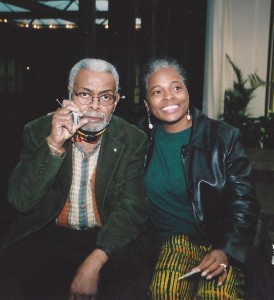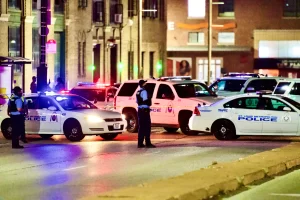Published by BlackCommentator
 “Appreciating what’s been said and if I understand correctly…” That was the routine and respectful phrase we used in the Congress of African People when were about to engage in some serious discussion. As I faced the reality of Amiri Baraka’s death, I couldn’t help but reflect on his impact on my life.
“Appreciating what’s been said and if I understand correctly…” That was the routine and respectful phrase we used in the Congress of African People when were about to engage in some serious discussion. As I faced the reality of Amiri Baraka’s death, I couldn’t help but reflect on his impact on my life.
As a young radical, heavily influenced by the Black Student and Black Power Movements, I was looking for a political home when a group of like-minded young people from St. Louis made a trip to New Ark, New Jersey to visit the headquarters of the Congress of African People (CAP). The rest is history.
The enthusiastic group came back to St. Louis and established the St. Louis chapter of CAP. We were not just swayed by the ideology of Black Nationalism or by Kawaida doctrine; it was the material manifestations that was inspiring. We saw the practical applications of Kwanzaa Principles such as Cooperative Economics and Collective Work and Responsibility with the internal restaurant and daycare as well as public enterprises like bookstores. We saw what organization looked like.
Kawaida was developed by Maulana Ron Karenga who was a part of CAP early on. It was based upon the synthesis of African traditions and lived experiences. Karenga may have been the originator but it was the CAP chapters across the country that popularized the doctrine, including the celebration of Kwanzaa. We were the first to celebrate Kwanzaa in St. Louis.
Under the leadership of Amiri and Amina Baraka, CAP was one of the most influential organizations of the post-Black Power Movement. It was where I learned to not just be a community organizer but a true Servant of the People.
CAP had a saying “Kazi is the Blackest!” Kazi means work in KiSwahili and the slogan emerged to counteract the ponderous of political rhetoric that was void of any action, any tangible transformative impact on our community. We learned to be hard workers with accountability to our people; we learned discipline, consistency and integrity. That exemplary work style became a hallmark of CAP.
I learned the importance of study and the organic relationship between study and practice. I learned to appreciate the liberation struggles of other peoples and gleaned lessons from those struggles that were useful to our fight in the U.S.
The continuous summing up this process helped to inform an evolving ideology that was problematic for some both inside and outside the organization. I’m specifically talking about the shift from cultural nationalism ultimately to left. I will be the first to admit that liquidation of CAP as a national-in-form mass organization was a political error but in retrospect, I also strongly believe that another formation rooted in a broader ideological framework was also necessary.
The original cadre of St. Louis CAP went on to make their mark on the city and continues to do so today. CAP-led or involved campaigns and projects such as the African Free School, Stop Killer Cops, National Black Assembly, etc. laid the groundwork for advances in our local work in education, electoral politics, prison reform and women’s issues.
Whenever Amiri came to St. Louis or I ran into him on the national conference circuit, he was always genuinely interested in how his students had grown political and what work we were doing. He responded like a proud father and I finally realized that we were his living legacy. Many of us True Believers all over the country were still actively engaged in the liberation of our people and the fighting against global imperialism.
Amiri Baraka was a world renown poet and playwright; he was a man with flaws and a self-awareness about those flaws. He has left us with many words in his poems, essays, speeches and books. He was a visionary who could see wider and farther than most. He has left me with a questioning nature of the conditions around me and a commitment to change those conditions.
Appreciating what’s been said – and done, I still don’t understand everything correctly but I’m continuing to learn and grow. Asante (thank you) Amiri for your sharing your wisdom, time and resources with generations of radicals and revolutionaries. Aluta continua – the struggle continues!
Photo credit: Roscoe Crenshaw



